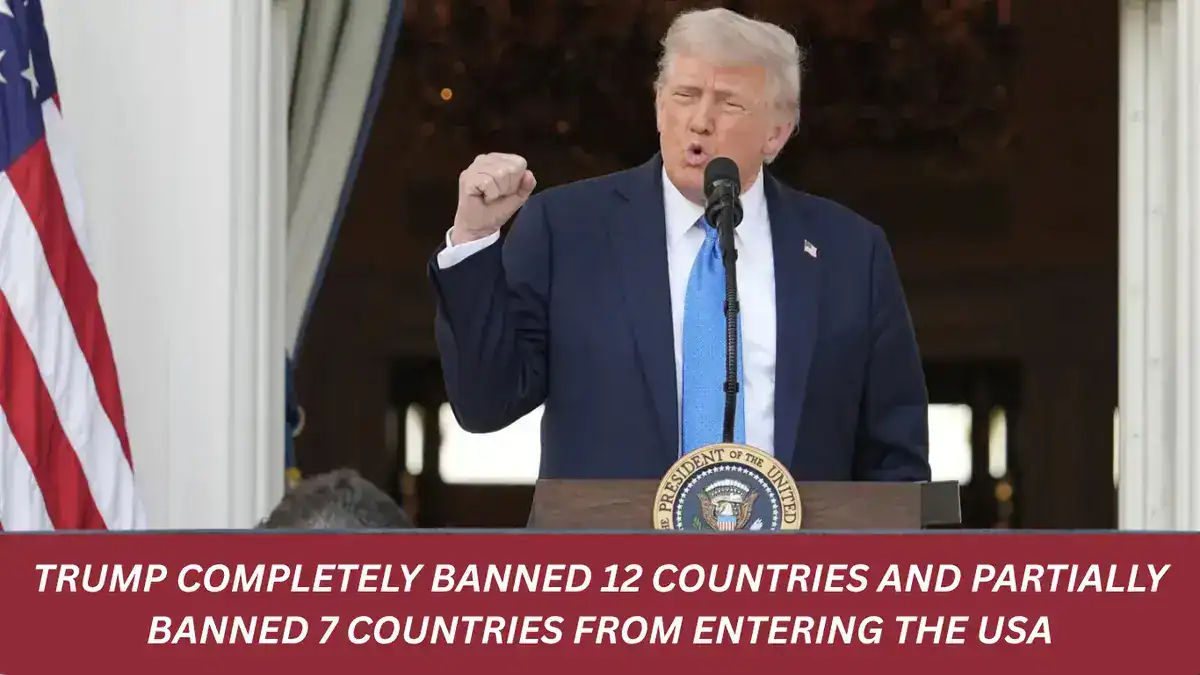Trump 2025 Travel Ban: What It Means and Who It Affects? On June 4, 2025, former President Donald Trump announced new travel ban that takes effect on June 9, 2025. The directive bars entry into the United States for citizens from 12 countries and imposes limited restrictions on nationals from 7 additional nations. The stated rationale behind the move is national security, particularly concerns about terrorism and visa overstays.
Trump 2025 Travel Ban. Countries Banned From Entering USA
Travelers from the following 12 countries are completely prohibited from entering the U.S., regardless of visa type. Countries banned from entering USA are:
-
Afghanistan
-
Myanmar
-
Chad
-
Republic of the Congo
-
Equatorial Guinea
-
Eritrea
-
Haiti
-
Iran
-
Libya
-
Somalia
-
Sudan
-
Yemen
Countries Facing Partial Entry Bans
Citizens from these countries are restricted from receiving tourist and immigrant visas (including B-1, B-2, F, M, and J types):
-
Burundi
-
Cuba
-
Laos
-
Sierra Leone
-
Togo
-
Turkmenistan
-
Venezuela
Who Is Exempt from Trump’s 2025 Travel Ban?
While the new U.S. travel ban is broad, there are specific categories of people who are clearly exempted from the ban. Here is a summary of those individuals who are still eligible to enter the United States even though they are from the banned countries:
- U.S. Green Card Holders
U.S. lawful permanent residents are excluded from the ban. - Dual Nationals
Holders of U.S. citizenship and citizenship of one of the prohibited countries are permitted entry. - Athletes and Coaches
Travelers to the U.S. for the purpose of competing in significant international sporting events like the Olympics or FIFA World Cup might be exempt, as long as the event is designated by the U.S. Secretary of State. - Afghan Special Immigrant Visa Holders
Afghan Employees of the U.S. Government or Allied Missions. Afghans employed by the U.S. government or allied missions and possess valid Special Immigrant Visas (SIVs) are eligible for entry. - Persecuted Iranians
Iranian citizens who are members of ethnic or religious minority groups persecuted in their home country can be admitted under humanitarian exemptions. - Long-Serving Foreign Employees of the U.S. Government
Foreign nationals employed by the U.S. government overseas for a minimum of 15 years—along with spouses and children—are exempt. - Refugees and Asylum Grantees (Pre-Ban)
Those who were granted refugee or asylum status prior to the ban’s effective date are exempt. - Immediate Family of U.S. Citizens
Foreign nationals seeking visas due to a relationship with an American citizen, i.e., spouse, parent, or child of a U.S. citizen, are typically exempt. - Diplomats and Foreign Officials
Individuals traveling to the U.S. on official governmental or diplomatic business are exempt from the ban. - UN Officials
Individuals from banned countries entering the U.S. specifically for official United Nations business are permitted entry. - Representatives of International Bodies and NATO
Individuals traveling to the U.S. on behalf of accredited international organizations or NATO for official business are not barred. - Children Adopted by American Citizens
International adoptees adopted by U.S. citizens are exempt from the travel ban. - Valid Visa Holders
Individuals from the affected nations with already valid U.S. visas issued before June 9, 2025, may still enter. The Department of Homeland Security, though, can deny entry at its discretion even with an already valid visa.
Policy Implementation and Legal Framework
The prohibition starts at 12:01 a.m. EDT on June 9, 2025, without an end date. In contrast to previous travel bans, this prohibition contains more data-driven rationales and a broader set of exceptions, making it possibly more resistant to court challenges. The administration has also intimated the list could shift depending on changing security analysis.
International and Domestic Reaction
The policy has attracted global criticism. Chad, for instance, retaliated by stopping visa issuance to Americans. In the United States, the ban has been criticized by immigration campaigners who say it is discriminatory, particularly against nations like Haiti where no specific threats have been publicly named.
Economic Impact
Fields that depend more heavily on immigrant workers, for example hospitality and food service, are already experiencing the pinch. Owners say the limits could make labor shortages even worse, threatening closure in some industries.

